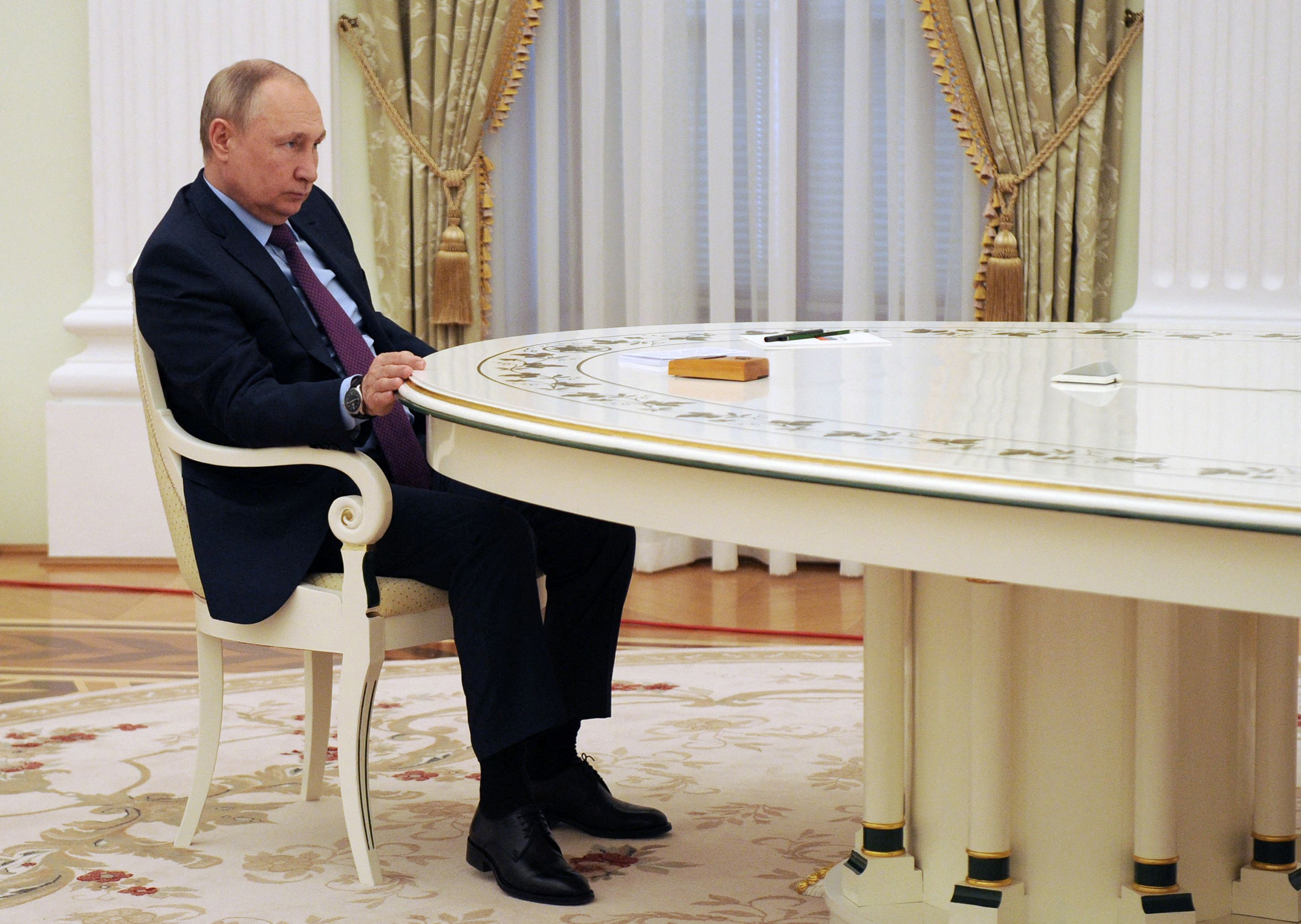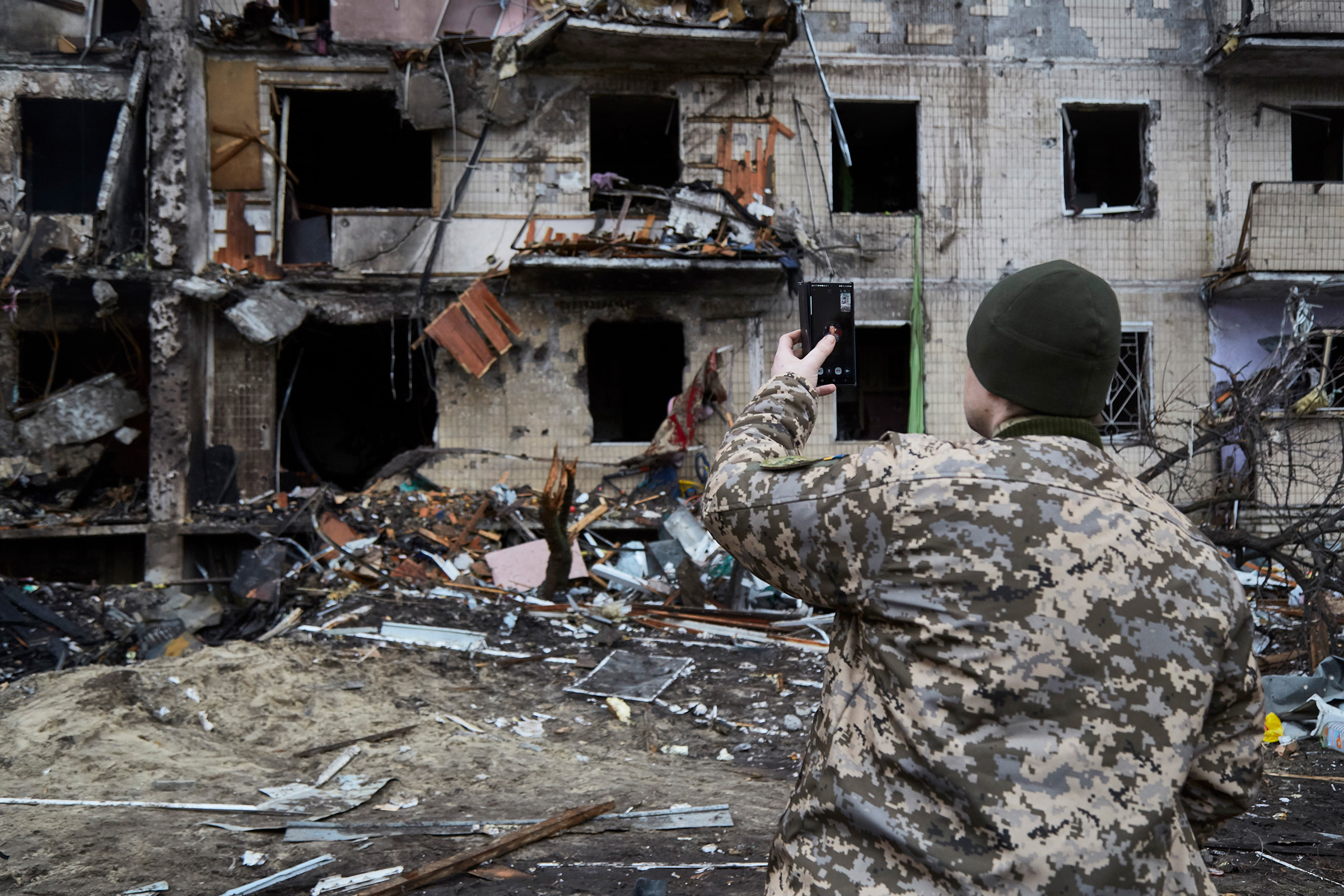
Exhausted and choked with emotion, a group of captured Russian soldiers told journalists in Kyiv on Monday that their government had betrayed them by sending them to fight a war under false pretenses. “I feel shame that we came to this country,” Lieutenant Colonel Astakhov Dmitry Mikhailovich said on camera. “We will go to jail or whatever we deserve.” Hours later, Ukraine’s President Volodymyr Zelensky bluntly stated what he thought they deserved. “All people who came to our land, all people who gave those orders, all soldiers who were shooting—they are all war criminals,” he told ABC News.
But experts say that proving Zelensky’s claim, and convicting people of war crimes—from frontline soldiers to President Vladimir Putin—will likely take years, with an uncertain outcome, despite the horrific violence. For indictments to stick in court, hard evidence will be needed— and not the kind of photo and video evidence that you might expect. The most important place to look is actually in soldiers’ pockets, says Bill Wiley, founder and executive director of the Commission for International Justice and Accountability, who has investigated conflicts for 25 years, in the Balkans, Iraq, Syria, Libya, and elsewhere. The “pocket debris,” as he calls it, includes cellphones and computers, written instructions from commanders, and battlefield maps.
These are all crucial in proving the pivotal issue in any war-crimes indictment: intent. While international laws of war forbid targeting civilians or civilian property, it also allows for innocent people being killed by accident in the crossfire, which would indemnify Russian soldiers and their commanders.
What is more, he says, there is no time to waste in collecting and safeguarding evidence from potential tampering, while Ukraine’s borders remain open and Russia does not control the country.
“The key is to get started now,” he says. “It is much easier to establish now, than when the net closes in more and more in Ukraine.”
The wrong way to prove responsibility
From the start, Ukrainians have been keenly aware of the need to gather evidence for possible war-crimes charges. Ukraine’s foreign minister Dmytro Kuleba tweeted the day after Russia invaded that the government was collecting details of Russian strikes, including on a kindergarten and an orphanage, to “immediately send to the Hague,” referring to the International Criminal Court, or ICC, which is located in the Dutch capital. “Responsibility is inevitable,” he wrote. And in fact, the ICC opened a war-crimes investigation on February 28.
Yet while Kuleba was talking as a politician fighting for his country’s survival, that “responsibility” might not be provable in court. “There is some pretty nasty-looking stuff which I suspect amounts to a crime, but we don’t know for certain,” Wiley says. “It is painfully difficult building cases like this.”
In the days since Russia invaded on February 24, Wiley, who has sat glued to the coverage, says he has watched regular Ukrainians make the same mistake as Syrians did during 10 years of war: Shooting hours of cellphone video, of bombed-out schools, houses, and apartment buildings—in the belief that they surely offer proof of war crimes. Ukraine’s government has also deployed teams to capture footage, in part to create a historical record of the war, as well as to gather trial evidence. “This is more about making a record of Russia’s crimes,” military videographer Serhiy Lysenko told the Washington Post, while filming the remnants of a bombed house south of Kyiv, where six people were killed. “We do believe in The Hague.”
But such footage is almost useless in a trial, according to Wiley. “At the end of the day, it is 99.9% of no use or relevance to a criminal case.”

Uncovering intent
A treasure trove of “pocket debris” could well be lying on the dead bodies of soldiers left on the battlefield, or in the uniforms of captured soldiers like Mikhailovich. The U.S. estimated on Tuesday that between 2,000 and 4,000 Russian soldiers have been killed in two weeks of war. Each might have carried valuable evidence, on the hard drives of their phones and computers, or in written notes or maps, all of which could be used to piece together the central question in a war-crimes case: Who ordered what crime.
From his years investigating the Syria war, including the terror campaign by the Islamic State, or ISIS, Wiley is certain that Russian officers in Ukraine carry critical items, including code books or equipment to decrypt coded messages. And lower-ranking Russian soldiers likely have a gold mine of information on their cellphones; the phones themselves offer precise tracking of their movements, and many would likely have shot photos and videos. ISIS appeared far more tech-savvy than the Russians, he says, “but even the thickest soldier has all manner of photos on his phone, giving us a sense of who else was and is in the same unit.”
Capturing that information, as well as intercepts, might already be underway. “The Ukrainians assuredly have directions from above to be collecting this stuff and passing it to intelligence analysis cells,” says Wiley, who once served as an infantry captain in the Canadian military. But he believes they might not be aware of how crucial the material is for a future war-crimes trial.
Based on his experience investigating the Syrian war—where Russia’s military provided essential firepower for the regime—Wiley believes Ukraine ought to be able to intercept Russia’s communications. “Russian communications, a lot of it, is not encrypted. It is pretty surprising,” he says. “On the battlefield a lot of the kit is very old.”
It is possible that communication is already being captured. U.S. Secretary of State Antony Blinken told CNN on Sunday that they had seen “very credible reports” of war crimes, and they were gathering all the details. “We are documenting everything,” he said. Wiley’s organization CIJA, launched in 2012, is funded by the U.S., U.K., Canadian and European governments, and he says he has already advised donors it would cost the group about €5 million a year to investigate the Ukraine war.
Similar to cellphone footage, Wiley says that there is also limited use in a trial for the testimony from refugees who have fled the war zones, and who human-rights organizations are debriefing across Ukraine’s borders. Those heartbreaking stories will not likely bolster the prosecution’s case in a war-crimes trial. Collecting the information, says Wiley “is a very, very small portion and fairly easy to do,” he says.
The bulk of the work will be piecing together a chain of command from the crime to the original order, in theory all the way to Putin. Given the Russian president’s overwhelming grip on the war, that chain might be far easier to trace than in other wars, according to some experts. “Very little is going to happen in this theater on the Russian side that would not be traceable right up the chain of command, to the top of the Russian state,” Stephen Rapp, who was the U.S. war-crimes envoy between 2009 and 2015, told Politico last week.
Still, it will require careful documentation to win a case in the Hague.
Protecting the evidence
Even while rockets pound cities and millions flee, physical evidence will need to be meticulously logged, and then safeguarded against tampering. Digital evidence will also need to be kept in a central, secure place. Wiley says Ukraine should immediately digitize all paper records they have found, and create several electronic, encrypted back-up systems, in case Kyiv falls to Russian control; he admits that “in the current circumstances, this will be difficult.”
In fact, even gathering the evidence could be complex and exceedingly dangerous, as Wiley’s organization learned in Syria. CIJA helped smuggle out of Syria about 1.3 million pages of documents over several years. The mountain of details helped it piece together the command structure of the war, by finding the initial orders—essential in identifying war criminals. There are also about 50,000 pages of ISIS documents, collected in the military campaign against the jihadists, along with dozens of seized cellphones and computers. “The key is to be able to find the captured originals,” Wiley says. “We need the primary sources.”
That entire archive is now in CIJA’s secure vault, in a secret location in Europe, and there are multiple back-up hard drives of the material. The documents have become a key source of evidence for about 15 countries’ law-enforcement authorities in criminal prosecutions, for example against members of ISIS, according to Wiley.
Ukrainian officials might seek to conceal what they have found, for fear of revealing to Russia what they know. But Wiley suggests Ukraine’s government should nonetheless immediately set up a secure storage system for evidence. Wiley fears that otherwise, evidence might be lost if Kyiv falls to Russian forces. “Even if they are collecting it, where is it going? Ukrainians are fighting for their lives,” he says.
More Must-Reads from TIME
- L.A. Fires Show Reality of 1.5°C of Warming
- Behind the Scenes of The White Lotus Season Three
- How Trump 2.0 Is Already Sowing Confusion
- Bad Bunny On Heartbreak and New Album
- How to Get Better at Doing Things Alone
- We’re Lucky to Have Been Alive in the Age of David Lynch
- The Motivational Trick That Makes You Exercise Harder
- Column: All Those Presidential Pardons Give Mercy a Bad Name
Contact us at [email protected]